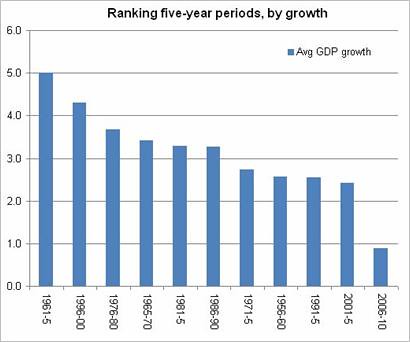The truth will set you free. Unless, that is, you're a Republican and the subject is taxes. As the New York Times reported on Thursday, "The Congressional Research Service has withdrawn an economic report that found no correlation between top tax rates and economic growth, a central tenet of conservative economy theory, after Senate Republicans raised concerns about the paper's findings and wording."
As documented in "15 Things the GOP Doesn't Want You to Know about Taxes and the Debt," virtually every article of conservative faith on tax cuts is demonstrably false. In contrast, what the yanked CRS report had to say on the history of tax cuts, productivity, investment, economic growth and job creation was indisputably true:
Throughout the late-1940s and 1950s, the top marginal tax rate was typically above 90%; today it is 35%. Additionally, the top capital gains tax rate was 25% in the 1950s and 1960s, 35% in the 1970s; today it is 15%. The real GDP growth rate averaged 4.2% and real per capita GDP increased annually by 2.4% in the 1950s. In the 2000s, the average real GDP growth rate was 1.7% and real per capita GDP increased annually by less than 1%.
There is not conclusive evidence, however, to substantiate a clear relationship between the 65-year steady reduction in the top tax rates and economic growth. Analysis of such data suggests the reduction in the top tax rates have had little association with saving, investment, or productivity growth.
However, the top tax rate reductions appear to be associated with the increasing concentration of income at the top of the income distribution. The share of income accruing to the top 0.1% of U.S. families increased from 4.2% in 1945 to 12.3% by 2007 before falling to 9.2% due to the 2007-2009 recession. The evidence does not suggest necessarily a relationship between tax policy with regard to the top tax rates and the size of the economic pie, but there may be a relationship to how the economic pie is sliced.
As the Times reported, Republicans claim to have been irked by the report's use of such terms as "Bush tax cuts" and "tax cuts for the rich." Their real problem, of course, is with the truth.
Now, Republicans have warned for decades that that increasing tax rates on so-called "job creators" will hurt employment and slow economic growth. As it turns out, the economy grew faster and produced more jobs when upper-income tax rates were higher--even much higher--than today.
That record prompted David Leonhardt of the New York Times to ask two years "Why should we believe that extending the Bush tax cuts will provide a big lift to growth?" His answer was unambiguous:
Those tax cuts passed in 2001 amid big promises about what they would do for the economy. What followed? The decade with the slowest average annual growth since World War II. Amazingly, that statement is true even if you forget about the Great Recession and simply look at 2001-7...
Is there good evidence the tax cuts persuaded more people to join the work force (because they would be able to keep more of their income)? Not really. The labor-force participation rate fell in the years after 2001 and has never again approached its record in the year 2000.
Is there evidence that the tax cuts led to a lot of entrepreneurship and innovation? Again, no. The rate at which start-up businesses created jobs fell during the past decade.

As ThinkProgress revealed in the charts at the top, the data are clear: lower taxes for America's so called job-creators don't mean either faster economic growth or more jobs for Americans.
It's no wonder Leonhardt followed his first question with another. "I mean this as a serious question, not a rhetorical one," he asked, "Given this history, why should we believe that the Bush tax cuts were pro-growth?" Or as Mark Shields asked and answered in April:
"Do tax cuts help 'job creators' or 'robber barons'?"
As the quashed analysis by the Congressional Research Service shows, lower income and capital gains tax rates don't correlate with high economic growth. Higher income inequality is another matter:

The CRS report should have been uncontroversial. But as just the latest analysis confirming that lightly-taxed job creators don't create jobs, just as tax cuts don't pay for themselves, the nonpartisan agency simply reported the truth. And apparently, it isn't setting Republicans free.
Source: http://crooksandliars.com/jon-perr/gop-protest-forces-congressional-research-service-tax-report
devils dodgers rachel maddow gia la riots new jersey devils torn acl
No comments:
Post a Comment
Note: Only a member of this blog may post a comment.